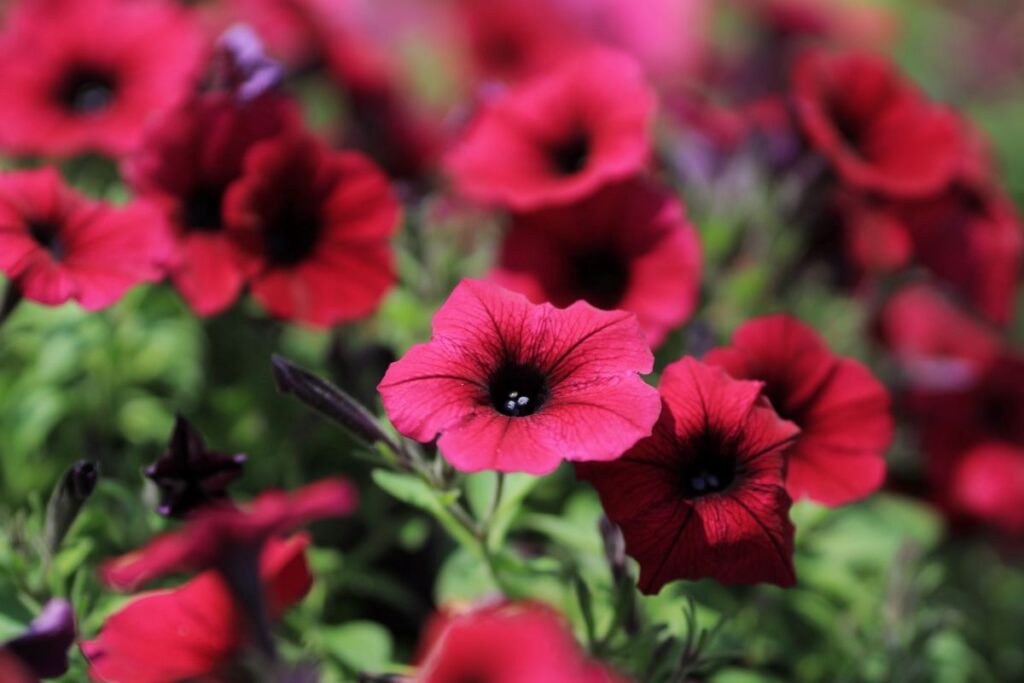You may have heard that petunias aren’t only known for their beauty but also their bug-repelling abilities. But is this true?
Well, in short – yes it is! There is evidence that they repel at least 5 common bugs in your garden.
Petunias can help you repel:
- Aphids
- Tomato hornworn
- Squash bugs
- Thrips
- Whiteflies
In this article, I’ll take a look at:
- The 5 common bugs that petunias repel
- How petunias repel these common bugs
- How to best use petunias to repel bugs
- Are petunias safe as both indoor and outdoor plants?

The Top 5 Bugs That Petunias Repel
1. Aphids
These tiny, wingless insects have the potential to harm a variety of garden plants as they feed on the sap.
However, petunias naturally produce chemicals and emit odors that repel aphids, effectively keeping them out of your garden.
2. Tomato Hornworm
These large, green caterpillars pose a big threat to tomato plants and other crops belonging to the nightshade family.
Fortunately, petunias serve as a deterrent when planted near your tomatoes, reducing the likelihood of tomato hornworm infestation in your plants.
3. Squash Bugs
The cucurbit family of plants, including squash, pumpkins, and cucumbers, are susceptible to damage by these usually small, brown insects that belong to the family Coreidae.
Petunias can help fend off these pesky pests by their odor, protecting your cucurbit plants from harm.
4. Thrips
Thrips are small insects belonging to the family Phlaeothripidae that can harm and discolor plants and flowers by feeding on plant tissues.
Petunias exude compounds that keep thrips away and can aid in avoiding severe infestations.
5. Whiteflies
Whiteflies are tiny, winged, white insects that belong to the Aleyrodidae family and are related to mealybugs and aphids. They generally cluster in groups and can be seen on the undersides of leaves.
By giving off a fragrance that whiteflies detest, petunias deter these insects.
As a result, the plants close to your petunias can also be protected from these pests.
The 5 Ways That Petunias Repel Bugs
Petunias have numerous properties in their arsenal to repel and fight back against unwelcome insects.
1. Scent
Petunias produce a strong fragrance similar to licorice that some insects may find unpleasant. Therefore, the scent acts as a natural deterrent, keeping pests away from your primary plants.
2. Sticky Hairs
Some varieties of petunias have sticky hairs on the leaves and stem that act as a trap for crawling insects, leaving them immobilized.
Once the insects get stuck in the plant’s hairs, they’re automatically prevented from reaching nearby plants that you’re trying to protect.
3. Alkaloids
Like other members of the Solanaceae family, petunias produce alkaloids that can have toxic effects on certain insects if ingested.
However, these compounds are produced in small amounts only and may not be effective in completely keeping some insects from snacking on your petunias.
4. Pyrethrins
Pyrethrins are chemical compounds found in petunias that act as natural pesticides, making them poisonous to many insects.
These substances disrupt pests’ neurological systems, leading to paralysis and, ultimately, death. If you’re a bug – beware!
5. Visual Deterrent
Petunias feature vivid, brilliant blossoms that can confuse and repel some insects in addition to their scent and chemical qualities.
Because Petunias generate visual distractions, some bugs that rely on particular visual signals to find their host plants may be prevented from landing or depositing eggs on your primary plants.

How to Effectively Use Petunias to Repel Bugs – 5 Top Tips
Even while petunias aren’t on par with other plants with bug-repelling properties, you can still effectively fight off pests and take pleasure in a bug-free garden by strategically planting petunias and blending them into your yard.
Here are some ideas on how you can use petunias to ward off insects:
1. Plant Your Petunias Strategically
Petunias should be strategically placed in your garden, especially close to plants that are prone to insect infestations. Vegetables, herbs, or other plants frequently invaded by pests should be bordered or planted alongside petunias.
For starters, petunias can be grown in hanging baskets, so you can position them precisely where the pests like to hang out.
2. Plant Them Next to Other Insect-Repellent Plants
By carefully planting petunias next to plants that are known to be insect-repellent, such as marigolds, lavender, or basil, you can make the environment more unpleasant for some insects.
Pests can be discouraged by the combination of these plants.
3. Use Them as a Companion Plant
Petunias can be used as companion plants for plants like herbs or vegetables susceptible to pest infestations.
Although petunias may not completely deter insects, their presence can serve to draw attention away from other vulnerable crops and lessen the likelihood of pest-related plant damage.
4. Attract Beneficial Insects
Ladybugs, lacewings, and hoverflies are just a few of the beneficial insects that petunias’ vibrant, aromatic blossoms may entice.
By eating pests like mites and aphids, these insects help to naturally reduce their populations. Petunias indirectly aid in pest management by luring advantageous insects.
5. Maintain Helathy Petunias
Improve the overall health of your garden by keeping your petunias well-watered, getting enough sunlight, and fertilizing them correctly.
In general, healthy plants are more resistant to insects and illnesses.
You can stop the issue from getting worse by routinely examining your garden and quickly treating any indication of fest infestations.
Are Petunias Safe for Pets as Indoor or Outdoor Plants?
When used as replants, petunias are regarded as safe for animals.
Cats, dogs, and other typical domestic pets aren’t drawn to eating these flowering plants. Petunia flowers or leaves accidentally consumed by or in touch with these animals are unlikely to cause serious harm.
However, pets should always be kept under close supervision in the garden or any other place containing plants for they may have a unique sensitivity to plants like petunias.
Therefore, a veterinarian should be immediately consulted if any negative responses or behavioral changes occur.
The Takeaway
Petunias are an excellent addition to any garden since they naturally help repel insects. By adding petunias to your pest control plan, you can have a lovely landscape while naturally keeping bothersome insects at bay.
However, although petunias can help keep bugs away, it’s also crucial to keep an ecosystem in balance and use other pest management methods as necessary.

